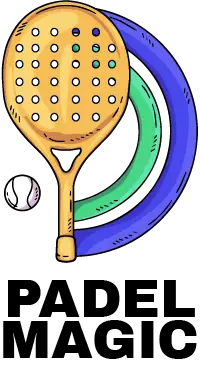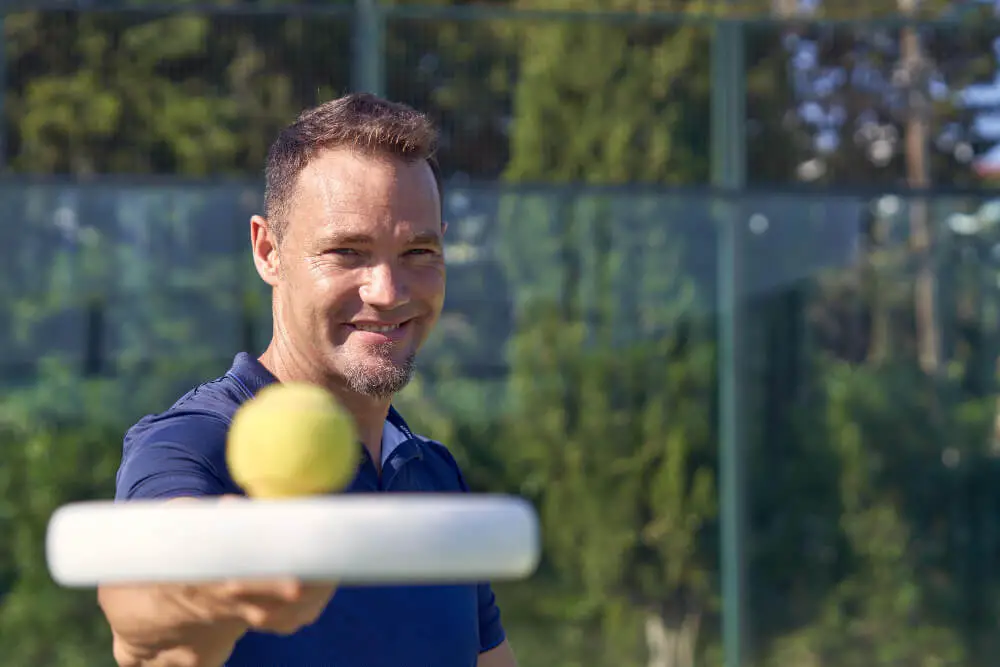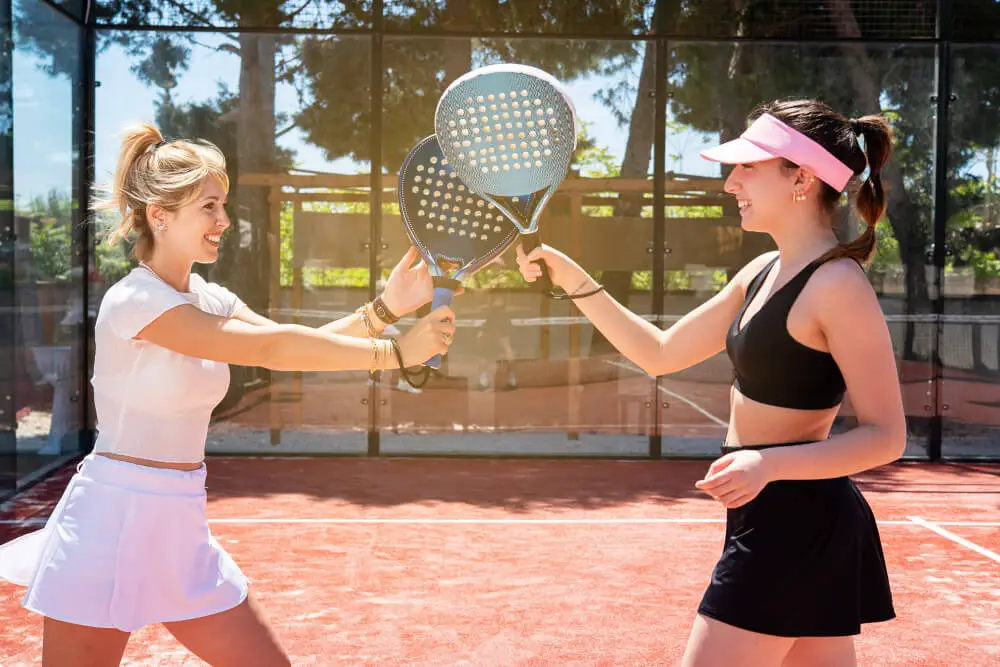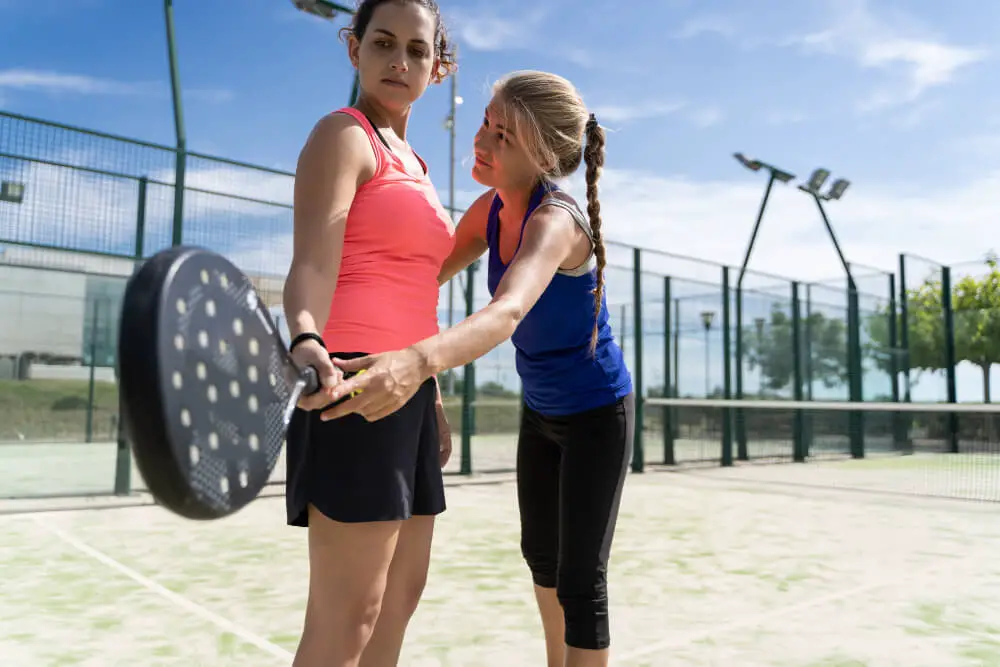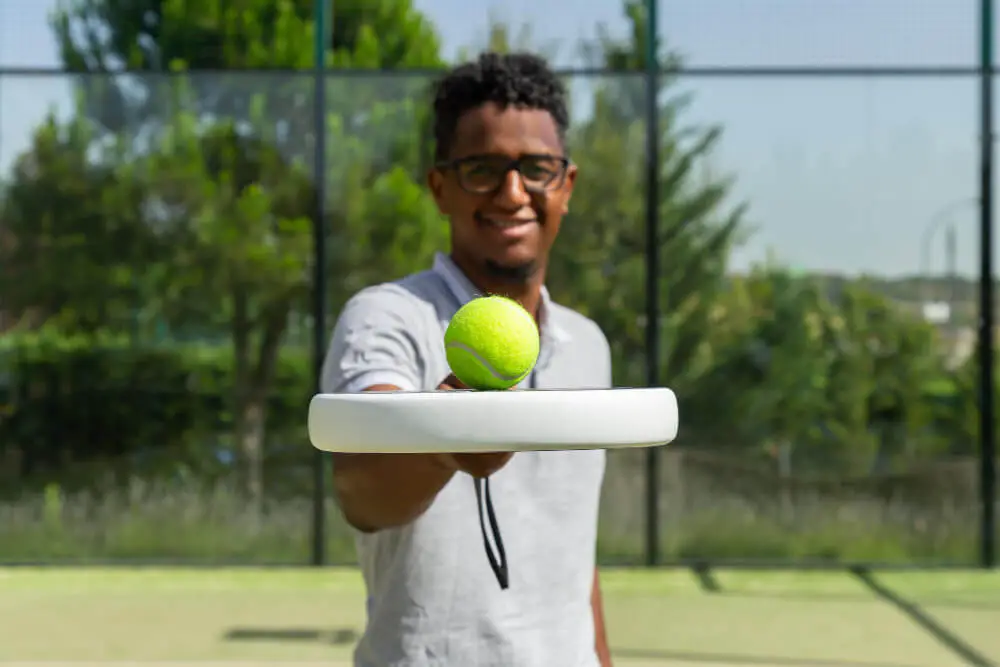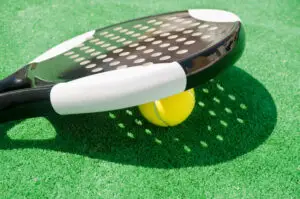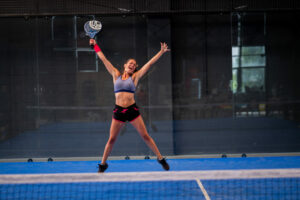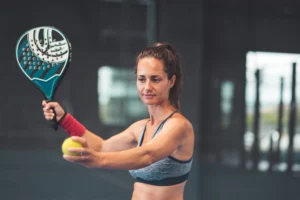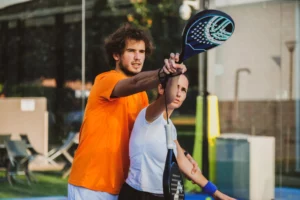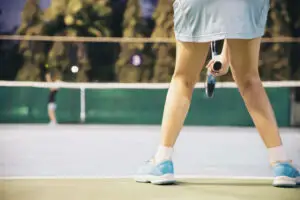For those who are brand new to the fun and fast-paced sport of padel, there are a few essential tips that you need to
Mastering Wall Play
Understanding how to use the walls effectively is a unique aspect of Padel. Practice hitting balls off the walls at different angles and learn how to anticipate their rebounds. This skill is key to turning defensive plays into offensive opportunities.
Balancing Power with Control
While powerful shots are important, control and precision often win points in padel. Focus on placing your shots accurately and using power strategically rather than relying solely on force.
Benefits of a Padel Coach
A skilled coach can provide invaluable insights into your game, from refining techniques to developing strategies. Regular coaching sessions can lead to significant improvements in your overall play.
The Importance of Teamwork
In padel doubles, success hinges on effective teamwork. Work on understanding your partner’s play style, communicating during the game, and developing complementary strategies.
The Necessity of Warming Up
A thorough warm-up prepares your body for the physical demands of padel and helps prevent injuries. Include dynamic stretches and light cardio to get your muscles ready.
Investing in Coaching Lessons
Structured lessons with a professional coach can accelerate your learning curve. They offer personalized feedback and can help you track and measure your progress over time.
Playing Against Superior Opponents
Seek opportunities to play against more skilled players. This can challenge you to raise your game, adapt to higher levels of play, and learn new tactics.
Optimizing Your Grip
Finding the right grip for your racket is crucial for executing different shots effectively. Experiment with various grip techniques to enhance your shot accuracy and comfort.
Solidifying Basic Shots
Ensure you have a strong foundation by mastering all the basic shots, including forehands, backhands, volleys, and lobs. Proficiency in these basics is essential for developing more advanced skills.
Know the basic rules of padel
Learning padel can be both fun and challenging. Before playing padel it is best to know the basic padel rules of the game so that you play by the official padel standards. Familiarize yourself with some of the more advanced strategies such as when to anticipate a shot, where to stand, and how to use different angles. This will help improve your game and enable you to become a more successful padel player.
Choose the right padel racket for your playing style
Choosing the right padel racket for your playing style can make or break any game. If you are a power player, then you will want to go for rigid and lightweight frames to help maximize your force. If you like to finesse the ball more and deliver spin and accuracy, then heavier rackets with more shock resistance will be perfect for you.
Don’t forget to also consider the grip size and shape that works best for your hand as this can give you improved control over every shot. Doing some research online or speaking to professionals in-store can help you decide which type of racket is right for you.
Improve your grip strength to better control the padel tennis ball
Having the right grip is essential to any padel player, as it will determine how you control the ball. Improving your grip strength means that you are able to produce more spin and power on the ball, rather than relying solely on your racket’s frame.
You can improve your grip by using hand grips (similar to those used in rock climbing) or tennis balls filled with water which add resistance when you squeeze them. Doing this 3-4 times a week for a few minutes at a time can help significantly improve your performance on the court. There is also a wide range of control padel rackets.
Be aware of the surrounding court conditions and adjust accordingly
It’s important to be aware of the court conditions – such as wind direction, humidity levels, and temperature
Master the art of the lob shot in padel
Learning how to execute a successful lob shot in padel is an art form, but mastering it will give you the edge you need to outsmart any opponent. You must have the timing down to perfection and be able to judge when the perfect opportunity arises.
Before attempting a lob shot, you should practice watching your opponent’s next move so you can anticipate and react accordingly. The footwork required for this shot takes a bit of finesse, as you must get into position quickly yet quietly before edging your way forward for the final point-scoring stroke. With practice, you’ll soon be an expert at calculating exactly when to unleash a powerful and accurate lob that sends your opponents scrambling in vain!
The importance of proper footwork and positioning on the padel court
Footwork and positioning on the padel court are essential for maximizing the potential of any player. Good footwork helps you reach where the ball is headed and be ready to make the next play quickly, giving you an advantage over your opponent.
Additionally, proper positioning gives a player the opportunity to use their shot selection to their advantage– whether that’s playing fast shots low to the ground or tapping higher balls in a corner, knowing exactly where you’re standing can help create angles your opponent won’t be expecting.
If a player properly utilizes their footwork and positioning on a padel court, they will have all the tools necessary for staying ahead of their competition with controlled plays.
How to improve your reaction time and anticipation in padel?
Improving reaction time and anticipation are key elements of success in this sport. Luckily, there are several strategies athletes can implement to hone these skills.
Increasing awareness by focusing on the flow of the game, learning to quickly read opponents’ movements and patterns, and efficiently using visual-spatial data to assess the court position will all help to sharpen your reflexes. Additionally, regular footwork drills can help improve agility as well as reaction time and anticipation.
Lastly, visualization techniques can be extremely useful in preparing you for possible scenarios so that you are able to react faster once they arise during gameplay. By consistently employing these tactics, you can become a more formidable opponent in padel.
Tips for developing a more powerful and accurate padel serve
Serving an effective padel shot often makes the difference between winning and losing during a match. Therefore, it is important to take the time to perfect this skill. The first step in developing a powerful serve is to use the correct technique – shift your weight forward, bend your legs slightly, keep your racket arm up, and hit through the ball.
Additionally, practice building strength and improving coordination in order to maximize power while maintaining accuracy. Going slower at first can also help build muscle control so you can be confident when serving during a match. With consistent practice and dedication, any padel player can improve their serve and become a more successful opponent on the court.
Effective strategies for playing doubles in padel
Padel is a great sport to play with friends and doubles is an especially fun way to get active outdoors. The key to success in doubles padel is communication between partners. Strategizing with your partner before each point can give a big advantage.
Keeping your shots low so that you can hit fewer volleys and working together on the court by trading off shot duties will also help ensure success. Remember, while competitive padel may be serious business, having fun comes first! Utilize these strategies when playing doubles and soon enough you’ll have unbeatable chemistry with your partner and pop out victorious on the court. Have fun!
The benefits of playing with different types of padel rackets
Playing with different types of padel rackets can be a great way to level up your padel game. Not only do they provide you with access to a variety of different styles, but they also allow you to hone in on your own strengths and weaknesses.
Playing with a superlight frame may give you more power and speed and play with an ultra-resistant frame may help you develop greater accuracy when hitting angles or shots down the line. What’s more, having the right racket can improve your confidence on the court; knowing that it’s the best fit for your style and abilities can make all the difference in taking that final shot. If you’re looking to switch things up, explore different types of padel rackets for better performance and greater satisfaction.
How to read your opponent’s body language and anticipate their next move?
Body language can tell you a lot about someone’s intentions, which is why understanding and reading it can be so useful, especially when anticipating an opponent’s next move.
A few common cues to look for are fidgeting, such as adjusting clothing and tapping fingers; decreased eye contact; altered breathing patterns; and tense posturing. These are indicators of distress or focus and they may signal that your opponent is planning a move.
By studying basic body language cues, you can gain insight into what your adversary might do next. Reading nonverbal clues will not guarantee success in any situation – but it can certainly give you an edge.
Ways to train off the court to improve your padel game
As any serious padel player knows, quality on the court is just as much a reflection of what you do off the court. By taking additional steps to enhance your physical and mental well-being, you can truly maximize how well you play during a padel match. Incorporating stretching into your day-to-day routine is one great way to ensure that you stay limber and don’t develop any unnecessary aches and pains.
Proper nutrition is also a must – eating healthy meals will give you energy and focus when the heat is on during a game. It’s important to maintain a positive outlook too; experiment with various types of meditation or yoga to keep your head clear from outside distractions (both on and off the court). Taking these steps can mean the difference between making it to the finals or not seeing past the first round of matches.
How to deal with pressure and stay focused in high-pressure situations in padel?
Padel is a growing sport that requires concentration and a certain calmness in high-pressure situations. Fortunately, there are padel tips you can use to help manage stress and stay on top of your game.
- One padel tip for dealing with pressure is to focus on yourself and your strategy rather than focusing on your opponents and their strengths.
- When it comes time to execute a shot, focus on what you need to do and don’t let the pressure keep you from staying in the moment.
- Other padel tips include ensuring that you take deep breaths, setting realistic goals, and taking small breaks throughout the game – all of which will help keep your head in the game so that you can stay focused under pressure.
With these padel tips at hand, padel players can better manage their worries during tense moments on court.
Common mistakes to avoid in padel and how to correct them
Padel is a great and increasingly popular sport, but it’s easy to make mistakes if you’re just starting out or don’t pay enough attention.
Improving one’s padel ability requires becoming aware of the common errors novices are prone to making and how to correct them. Common beginner padel tips include ensuring your feet remain shoulder-width apart when receiving shots, keeping your legs bent while playing rallies, and staying in an upright position in order to fully observe your opponent’s movements.
Additionally, padel players should practice evenly distributing weight between their left and right sides during their stroke hit, as this helps improve control of their shots. By taking the time to implement these padel tips whilst playing, padel lovers can avoid these common errors altogether.
How do I improve my padel game?
For those looking to improve their padel game, consistent practice and dedication are keys to success. Working on basic skills such as positioning, footwork, and accuracy can give a beginner the fundamentals they need to progress further in the game.
It is also important to track your progress by keeping score or video recording it so you can identify areas of weakness that need improvement. Additionally, learning the rules of the sport thoroughly will help you play a more strategic game.
Finally, seeking feedback from more experienced players is an excellent way to gain insight into how to become better at padel. With effort and some key strategies in mind, any budding padel player will find themselves ready for a highly rewarding experience!
What are the secrets of padel?
Padel is a relatively new sport compared to most and it has gained massive popularity since its inception. It nearly combines the best elements of tennis, squash, and badminton, thus offering something unique in the world of competitive sports.
While some people try to learn this sport by trial and error, the key to mastering padel lies in understanding the fundamentals of each game that make up the complete experience. A good eye for strategy, physical agility, quick reflexes, and stamina are just a few of the necessary skills needed for high-level play. Mastering them could unlock an entirely new level of enjoyment when playing padel at any level!
What should I do before a padel game?
Before a padel game, it is essential that you take adequate precautions to ensure that your game goes off without a hitch. Firstly, warm up and stretch your body so that you don’t experience any injuries during gameplay.
Secondly, make sure to check if your racket grip is secure because if it’s too tight or too loose it can affect your playing ability. Lastly, keep yourself hydrated throughout the match as dehydration can take its toll on both your physical and mental state of mind and drastically reduce your performance. All in all, taking these precautions before starting a padel game should help you have an enjoyable yet competitive experience.
How can I improve my serve in padel?
To improve your serve in padel, it’s important to practice your technique and develop a consistent routine. This can include focusing on your footwork, grip, and swing, as well as varying your serve placement and speed to keep your opponents off-balance.
What are some strategies for playing doubles in padel?
Some strategies for playing doubles in padel include communicating effectively with your partner, focusing on court positioning and movement, and using a variety of shots to keep your opponents guessing. It’s also important to play to your strengths as a team and to adjust your strategy based on your opponent’s weaknesses.
How can I improve my reflexes in padel?
To improve your reflexes in padel, it’s important to practice drills that focus on quick reactions and reflexes. This can include practicing volleys, half-volleys, and reaction drills with a partner or coach.
What are some tips for playing in windy conditions in padel?
Some tips for playing in windy conditions in padel include adjusting your shots to account for the wind, using a lower trajectory on your shots, and staying focused on your footwork and court positioning. It’s also important to communicate with your partner and stay mentally tough in challenging conditions.
In conclusion
By following all of these tips, you will become an effective padel player. Learning a few strategies, like mastering the art of the lob shot and improving your footwork and positioning on the court will help you increase your chances of winning. In addition, developing a more powerful and accurate padel serve, reading your opponent’s body language, and learning how to choose the right padel racket for your playing style will give you an upper hand in the competition. Last but not least, strengthening your grip strength, improving your reaction time, and becoming familiar with different types of padel rackets can provide you with additional energy and confidence during play. All these key factors combined should bring about success for you in the game of padel!
